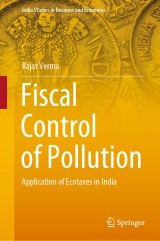Details

Fiscal Control of Pollution
Application of Ecotaxes in IndiaIndia Studies in Business and Economics
|
117,69 € |
|
| Verlag: | Springer |
| Format: | |
| Veröffentl.: | 08.07.2021 |
| ISBN/EAN: | 9789811630378 |
| Sprache: | englisch |
Dieses eBook enthält ein Wasserzeichen.
Beschreibungen
This volume analyses the process and structure of ecotaxes in India to bring forth its rationale, application and incidence on emerging environmental problems on the backdrop of the environmental issues confronted by the Indian economy. Being at infant stage in India, the concept of ecotaxes is plagued with large empirical difficulties. This book provides a holistic understanding of the complexities in the design and implementation of these fiscal instruments at the country level. After elaborating on the theory, history of its applications, the book provides an innovative methodological exercise. It examines the adequacy and relevance of ecotaxation in the Indian context, along with ensuring that the distortions due to the proposed levy are minimised. The incidence of these taxes on the households, the double dividend hypothesis and the effect on competitiveness of the producer are a few of the core themes elaborated upon in this book. This is demonstrated through a linear general equilibrium framework of Environmentally extended Social Accounting Matrix (E-SAM).<p>The book provides material for the researchers and graduate students on the methodological structure of eco-taxes. The proposed methodological intervention could be utilised by the researchers who wish to analyse the macroeconomic impact of <i>any</i> tax through the framework of Social Accounting Matrix (SAM). Additionally, the process as well as the implications and nuances provided in the book will assist the policy makers to design innovative policies for dealing with environmental issues. The volume also has something for the practitioners by helping them comprehend various effects of these instruments on different stake holders of the economy and thus will be useful as a policy prescription. The three policy scenarios analysed in this study could be considered by the policymakers while attempting to design these instruments in the Indian context and thus ending the extensive reliance on the age oldand grossly ineffective Command and Control (CAC) Policies.</p>
Introduction.- International Experiences of Eco-Taxes: A Few Lessons.- Environmental Regulations in India.- Summary and Conclusions.
<b>Rajat Verma </b>is presently the Chairperson of the School of Economics at NMIMS-Bengaluru Campus. Prior to joining NMIMS he taught in Bengaluru Dr. B. R. Ambedkar School of economics (BASE). He has also taught several courses in the discipline of Economics in various colleges of the University of Delhi from 2011-2013. He pursued his Ph. D. in Economics with a specialization in Environmental Economics from the Institute of Social and Economic Change, Bangalore. Dr. Verma has published innovative research papers on the topic of environmental taxes and has also published in the field of international trade. He specializes in Social Accounting Matrix based analysis and has research interests in areas of environmental economics, public finance and international trade.
This volume analyses the process and structure of ecotaxes in India to bring forth its rationale, application and incidence on emerging environmental problems on the backdrop of the environmental issues confronted by the Indian economy. Being at infant stage in India, the concept of ecotaxes is plagued with large empirical difficulties. This book provides a holistic understanding of the complexities in the design and implementation of these fiscal instruments at the country level. After elaborating on the theory, history of its applications, the book provides an innovative methodological exercise. It examines the adequacy and relevance of ecotaxation in the Indian context, along with ensuring that the distortions due to the proposed levy are minimised. The incidence of these taxes on the households, the double dividend hypothesis and the effect on competitiveness of the producer are a few of the core themes elaborated upon in this book. This is demonstrated through a linear general equilibrium framework of Environmentally extended Social Accounting Matrix (E-SAM).<p>The book provides material for the researchers and graduate students on the methodological structure of eco-taxes. The proposed methodological intervention could be utilised by the researchers who wish to analyse the macroeconomic impact of <i>any</i> tax through the framework of Social Accounting Matrix (SAM). Additionally, the process as well as the implications and nuances provided in the book will assist the policy makers to design innovative policies for dealing with environmental issues. The volume also has something for the practitioners by helping them comprehend various effects of these instruments on different stake holders of the economy and thus will be useful as a policy prescription. The three policy scenarios analysed in this study could be considered by the policymakers while attempting to design these instruments in the Indian context and thus ending the extensive reliance on the age old and grossly ineffective Command and Control (CAC) Policies.</p>
Provides comprehensive understanding of structure and process of international ecotaxes for policy purpose in India Contains implementation process and methodological framework for analysing the impact of ecotaxes or any tax in a linear general equilibrium framework Offers comprehensive treatment of the issues related to environmental fiscal instruments in the Indian context

















